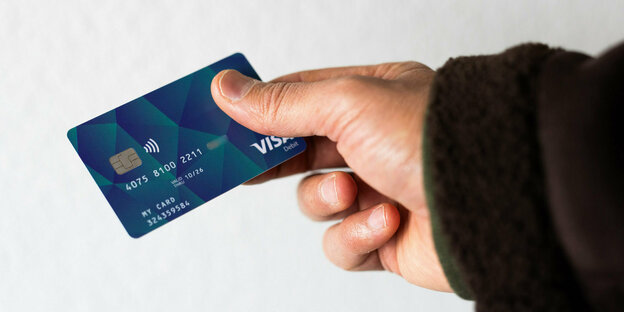In the future, part of refugee benefits will be paid by cards. Activists fear it is mainly about deterrence.

It looks like a normal bank card: payment card for refugees in Baden-Württemberg Photo: Philipp von Ditfurth/dpa
SEDAN taz | Almost all federal states have agreed on uniform standards for payment cards that should be issued to refugees. Only Mecklenburg-Vorpommern and Bavaria are planning their own models. The chairman of the Conference of Prime Ministers, Hesse state leader Boris Rhein (CDU), placed the decision in the context of a “high and sustained influx of refugees into Germany.” Human rights organizations criticize that payment cards make the lives of asylum seekers unnecessarily difficult.
With the agreement, the states want to implement a decision from November, when Chancellor Olaf Scholz (SPD) agreed with the state leaders on the basic principles of the payment card model. Wednesday's document provides that in the future refugees will receive at least part of their benefits through a card subject to state control. Benefits are not transferred to a regular account nor paid in cash.
According to the Hesse State Chancellery, it should be a “balance-based card with debit function without account connection.” Countries should be able to individually decide what proportion of benefits end up on the card and how much money refugees receive in cash or transferred to their regular account. In principle, it should not be possible to transfer money or pay abroad with the card.
From a purely technical point of view, the planned card should be usable in all sectors and in all parts of Germany, although its use should be able to be “regionally restricted” by the federal states. Furthermore, certain sectors should be excluded. In any case, it is not possible to pay in stores without card readers, which excludes refugees from numerous second-hand stores. It may also be impossible to order online with the new card.
Less administrative work for municipalities
Hesse Prime Minister Boris Rhein said in a statement on Wednesday: “With the introduction of the payment card, we reduce the administrative burden on municipalities, preventing the possibility of transferring state aid money to the countries of origin and thus combating inhuman crime smuggling.” A press conference is scheduled for Wednesday lunchtime at which Rhein wants to explain the plans in more detail.
Andrea Kothen of Pro Asyl on Wednesday called the payment card model a “discrimination program without rhyme or reason.” She told the taz: “It is obvious that refugees with worse living conditions must be deterred. She assumes that the actual design of the payment card system will vary from country to country: “All forms of discrimination are possible.” It remains the responsibility of each country to renounce the payment card or use it without discrimination to care.
So far, payment cards are only available in some places in Germany, such as Hanover. However, the model there is designed in such a way that it significantly simplifies the lives of refugees. The “socialCard” does not differ in its functions from a normal current card. Mecklenburg-Vorpommern, which is planning an independent card program that should be explicitly “non-discriminatory,” could also go down this path. Bavaria also has its own path in mind. However, the federal government is planning a much more restrictive payment card system than that agreed on Wednesday in other federal states.